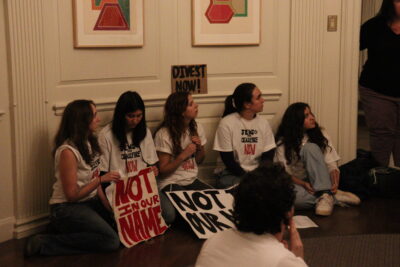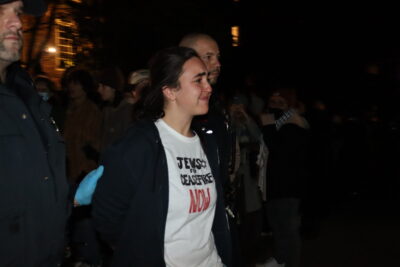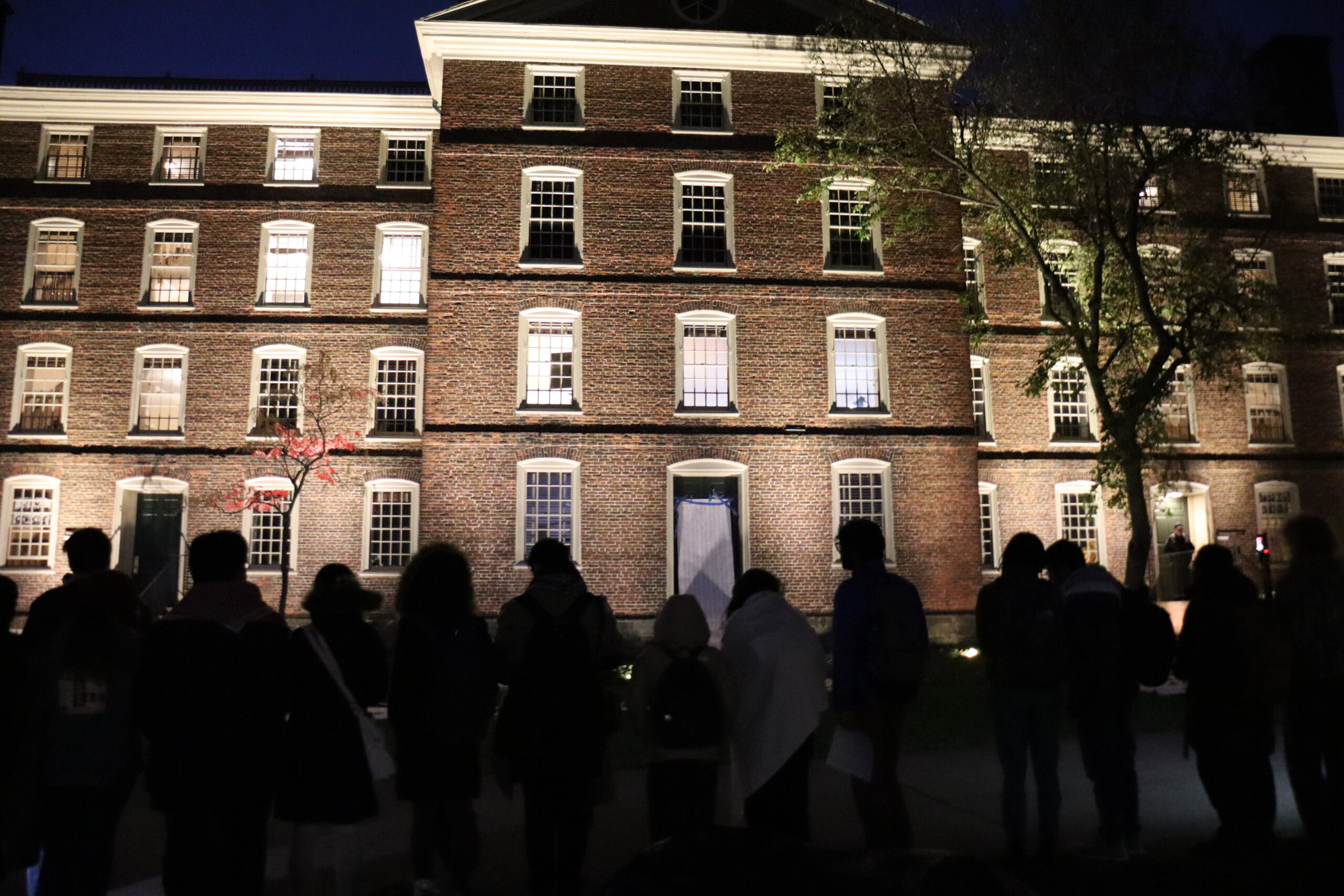At 5:44 pm on November 8th at Brown University, 20 Jewish students were arrested by Providence Police for staging a peaceful sit-in at University Hall, the school’s main administrative building. Then they were escorted in handcuffs past hundreds of their peers singing the Hebrew and English song “Olam Chesed Yibaneh.” For close to two hours, the crowd repeated the lyrics: “Olam chesed yibaneh; I will build this world from love; And we must build this world from love; And if you build this world from love; Then we will build this world from love.”
“We will not leave University Hall until President Christina Paxson publicly commits to include and support a divestment resolution in the next meeting of the Brown Corporation,” the group BrownU Jews for Ceasefire Now declared in an Instagram post announcing the sit-in.
BrownU Jews for Ceasefire Now was launched with the publication of an op-ed in the Brown Daily Herald entitled “An open letter from Jewish students.” Since the sit-in, the group has started a wave of Jewish groups at other schools – such as Harvard and Columbia– now protesting for a ceasefire in Israel and Palestine.
A press release from the group stated: “During the sit-in, Brown administrators informed the group that President Paxson would not budge on their demands. Since their demands weren’t met, the students continued the sit-in, singing, praying, and peacefully calling for divestment and a ceasefire. After 5 PM, students were informed by deans that they would be trespassing if they remained in the building.”

While this group operates under a new title, this movement is not new. Brown Students for Justice in Palestine (SJP) has been pushing for divestment since 2012. In 2020, based on a 2012 letter, Brown’s Advisory Committee on Corporate Responsibility in Investment Policies recommended that the university withdraw endowment funds from corporations that enabled human rights violations within Palestine. According to the Brown Daily Herald, President Paxson said, “The recommendation to divest still does not meet the standard as stated in the committee’s charge.”
Though November 8th was the first time Brown arrested its students in decades, the school has a long and significant history of student protest. In 1968, African-American students walked out to protest the University’s lack of Black enrollment and financial support. In 1986, students fasted to call for divestment from South Africa’s apartheid regime, and the following year, 23 students interrupted a corporation meeting to demand divestment from companies enabling South African apartheid. In 1992, hundreds of students sat in at University Hall to demand need-blind admissions. Then, more recently, the campus erupted with protests when NYPD Commissioner Ray Kelly visited in 2014.
Rafi Ash, a sophomore at Brown and one of the 20 students arrested, shared that he “participated in the sit-in because my Jewish upbringing has compelled me to build a safer and more just world.”
Ash continued, “It has been amazing to see how supportive our campus community is in so many ways, despite opposition from a conservative administration.”
Lily Gardner, is a sophomore at Brown who helped to organize the sit-in and was arrested. She explained why it was important for the group to join Brown University’s long history of protesting through sit-ins: “We were really inspired by the Grand Central sit-in and the work that other colleges are doing at UMass Amherst, Dartmouth. We wanted to really stand in solidarity with them and the work that was happening,” Gardner shared.

“The initial hope was that we’d be able to go in and start to sit and that we would actually have a conversation about agreeing to our demands and supporting a divestment resolution as it went to the corporation, and that was really quickly shot down,” Gardner said.
“When we were told we were going to be arrested,” Gardner shared, “I did cry, even though I knew it was a possibility, but then that scariness turned into an overwhelming sense of gratitude and grounding because of the people I was there with.”
Rita Feder, an Israeli-American senior at Brown, did not partake in the sit-in but was heavily involved in organizing efforts, including helping bring together the group that became known as BrownU Jews for Ceasefire Now. This group, as of November 2023, has over 100 members.
“It felt historic in a lot of ways, in knowing that the university hasn’t arrested its own students in over 30 years. And watching [Brown] parade its students in handcuffs felt like a really, really big deal,” Feder shared, describing what it was like to watch 20 of her peers get arrested.
Feder particularly emphasized why it was crucial that the students arrested were all Jewish. “This is not just a Palestinian issue…I strongly feel that Israeli and Jewish liberation is inextricably intertwined with Palestinian liberation. And so I cannot sit silently because my people and my family’s safety and security are also at risk,” Feder said. “We can’t let our fear delegitimize advocacy for Palestinian liberation, so we kind of knew that if Palestinians were to be the ones who did the sit-in, or non-Jews…it would have been very easy to cast them aside as antisemitic…which I know is not true.”
Feder highlighted the “incredible amount of suppression of Palestinian voices in the United States right now. The broad strokes equivalency of antisemitism and anti-Zionism is casting so much valid Palestinian advocacy aside with claims of antisemitism.”
“I am terrified of antisemitism. I think it’s very real. It is on the rise. And as a Jew with Jewish family who can not easily pass as not Jewish, I’m not going to sit here and say that it’s not scary,” Feder said.
Feder continued to emphasize the importance of solidarity and the fact that over 14,000 Palestinians have been killed, and she feels there is a moral responsibility to speak up because “If no one speaks now, who’s ever going to speak? And if we don’t speak, who is ever going to speak?”
Following pressure from thousands of alumni and over 160 Brown faculty, the University dropped all charges on November 27th. In a press release, the group wrote “While we are relieved our peers are no longer risking criminal charges, this is far from the end of our fight. Neither our sit-in demands nor the demands of SJP and PSC have been met — Brown University and President Paxson refuse to consider divesting from companies profiting from violence in Gaza and refuse to call for a permanent ceasefire, and the administration has clearly failed to protect its Palestinian students.”
On Saturday night, three Palestinian students were shot in Burlington, VT — including a junior at Brown, Hisham Awartani. This caused Paxson to release a statement saying: “There is so much confusion, fear and anger being felt right now that we feel this is a time to bring our community together and try to set aside issues that are exacerbating tensions and divisions on our campus.”
BrownU Jews for Ceasefire Now has expressed that this shooting further emphasizes the need for the protection of Palestinian students on campus.

